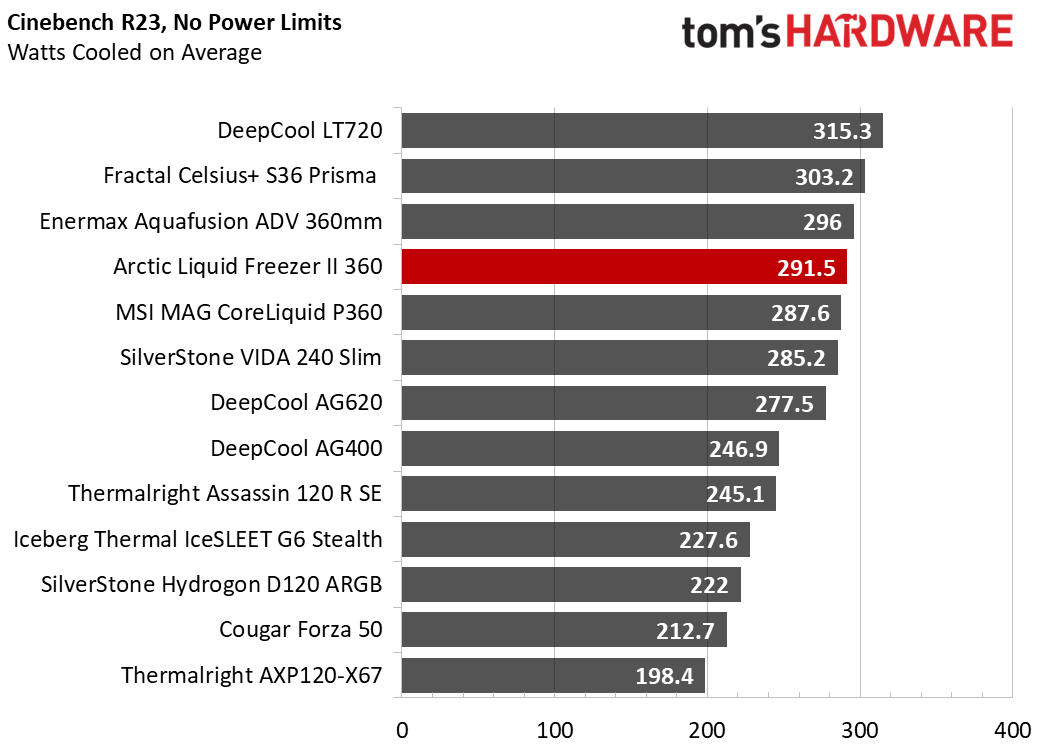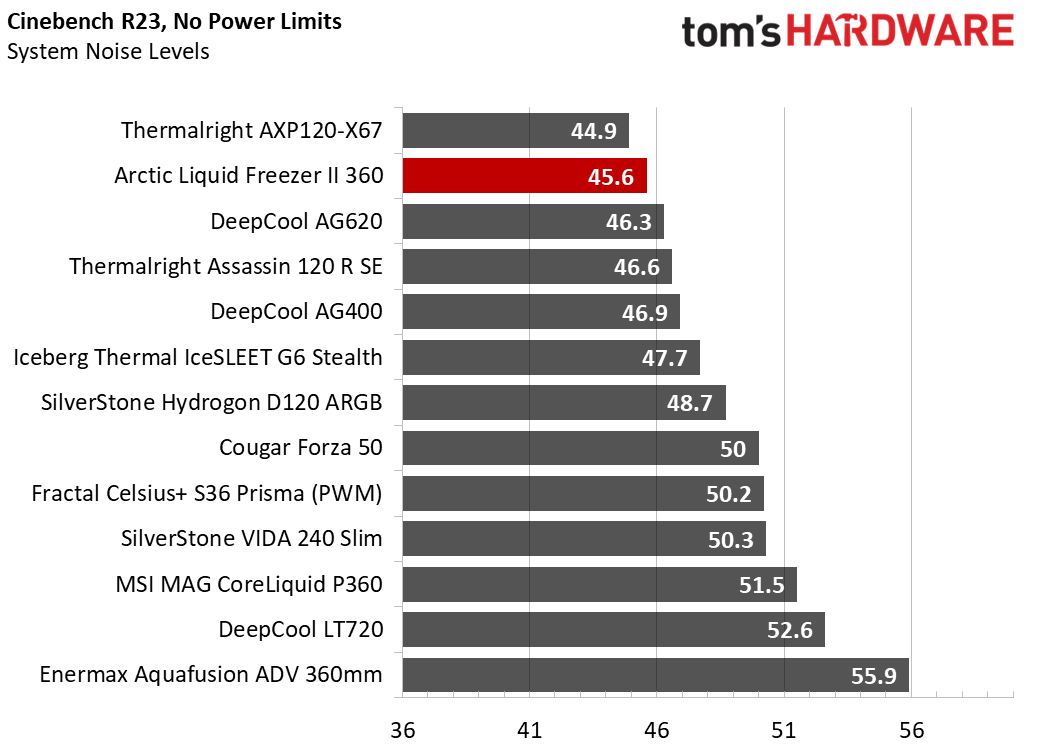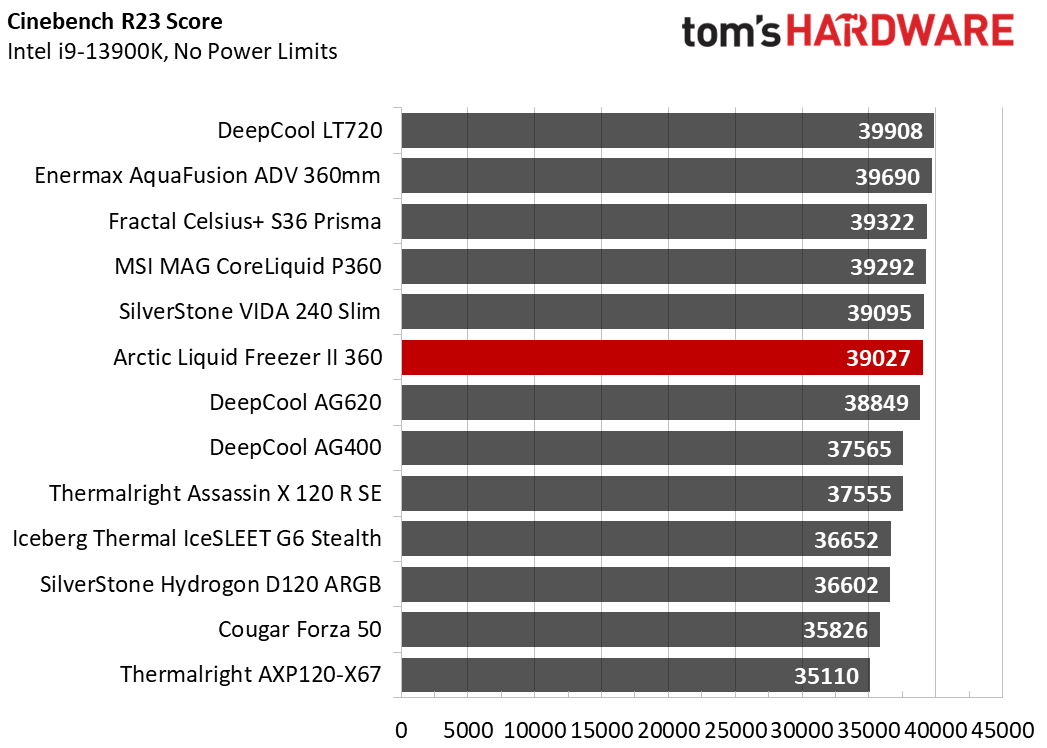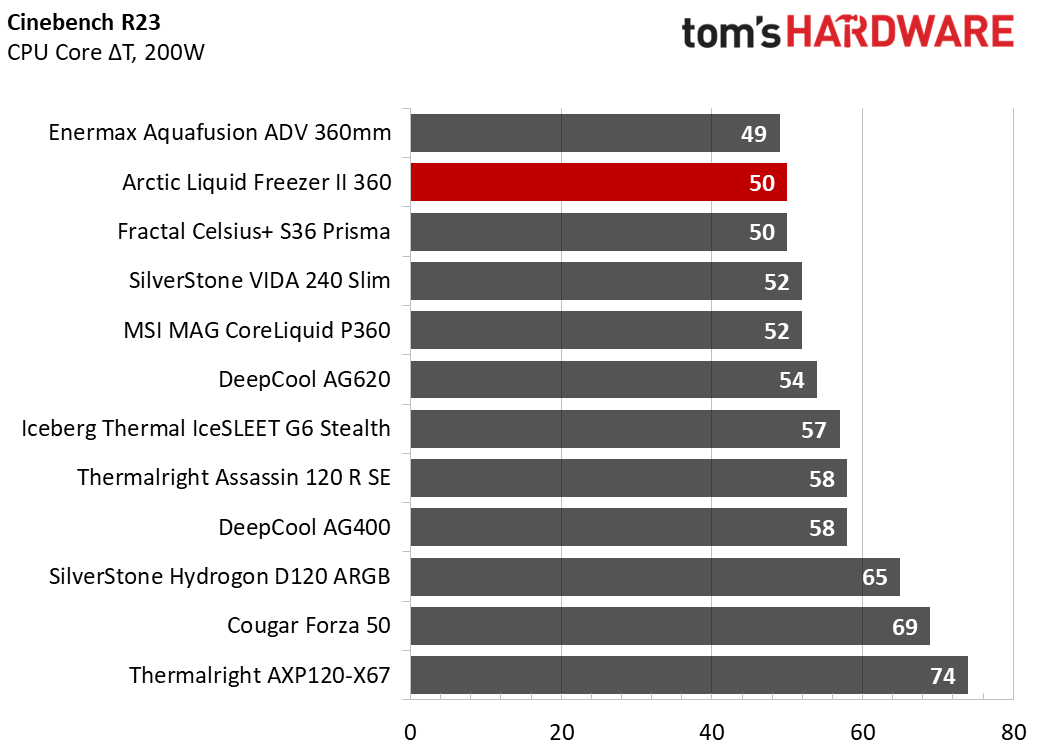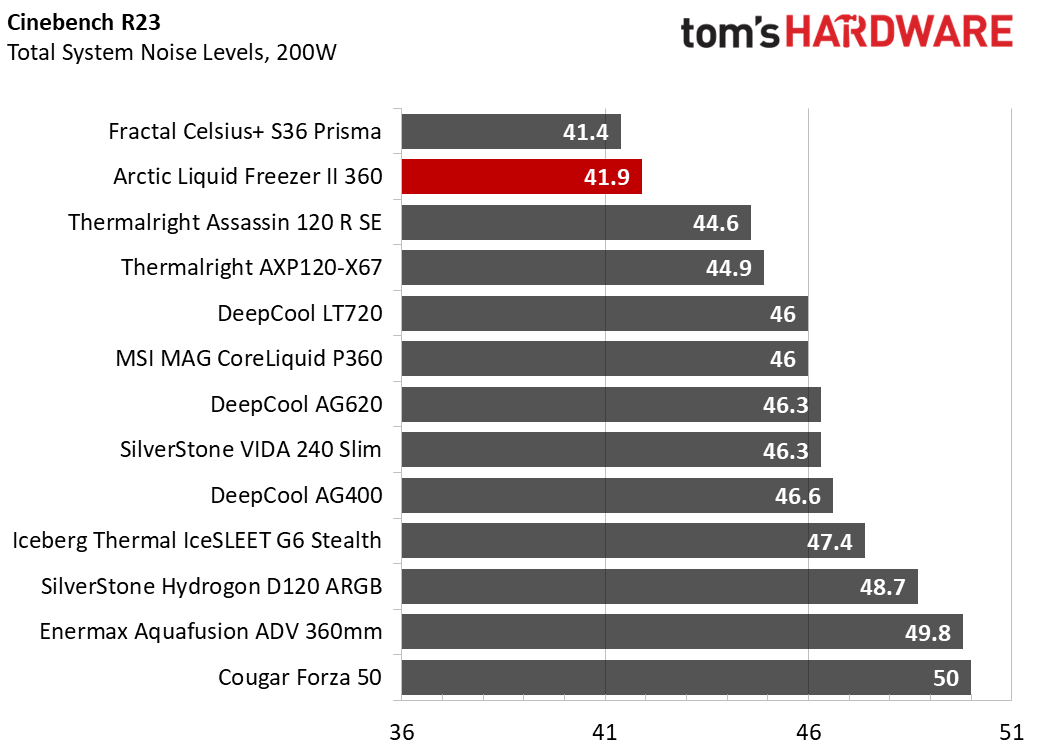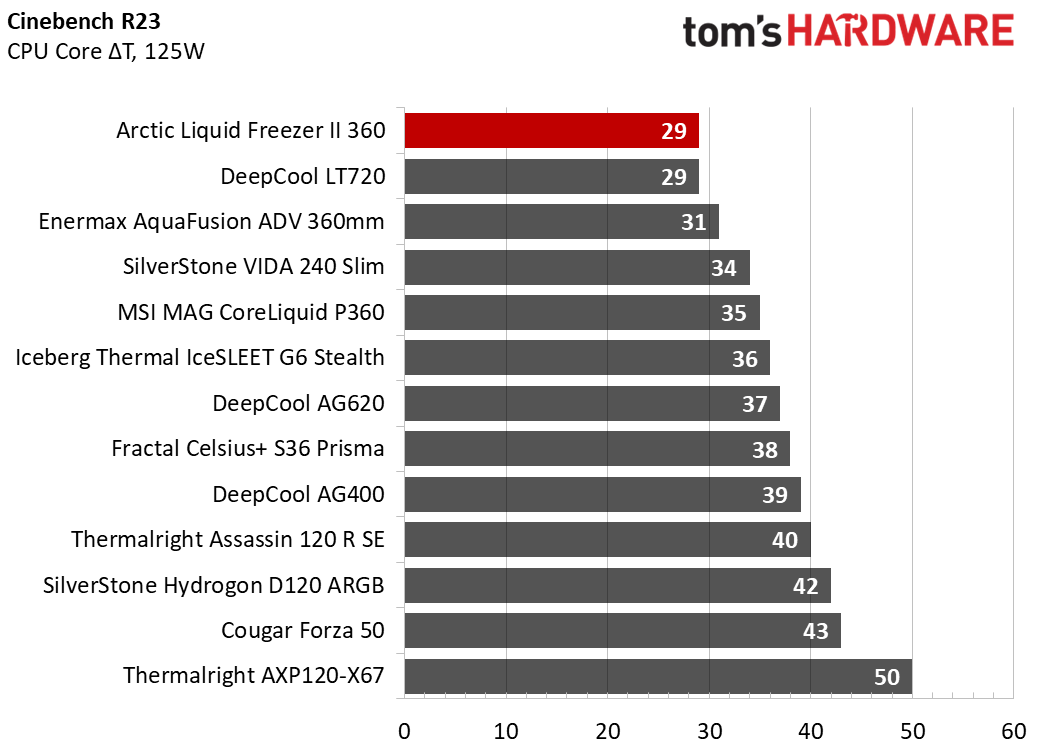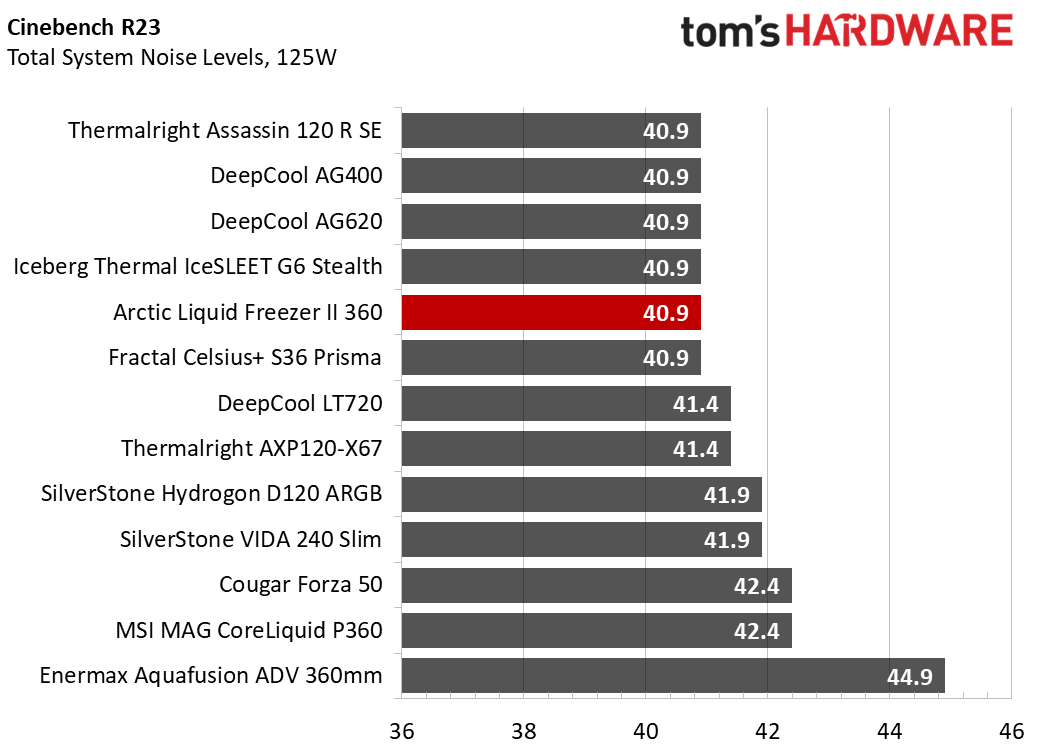Why you can trust Tom's Hardware
No Power Limits Cinebench Results
With Raptor Lake’s i9-13900K pushing speeds of 5.5Ghz+, even the strongest of coolers hit TJ max while running Cinebench R23 and other demanding scenarios. As the 13900K is designed to aim for its top safe temperature, we’ll be comparing the overall benchmark score and the CPU’s clock speeds instead.
The results below are for a 10-minute testing run. But to be sure that was sufficiently long to tax the cooler, we also retested both Thermalright’s Assassin X 120 R SE and DeepCool’s LT720 with a 30-minute Cinebench test. The results didn’t change much at all with the longer test. The average clock speeds maintained dropped by 29Mhz on DeepCool’s LT720 and 31Mhz on Thermalright’s Assassin X 120 R SE. Looking at this another way, that’s an incredibly small 0.6% difference in clock speeds maintained, a margin of error difference that tells us that the 10 minute tests are indeed long enough to properly test the coolers.
Because of the difficulty of cooling the i9-13900K in this workload, the best way to compare coolers here is to record the average power consumption of the CPU. Looking at this by total watts cooled only, the Liquid Freezer II is performing better than any air cooler tested, but a bit behind the other high end AIOs we’ve tested with this CPU so far. However, that’s only part of the equation. Let’s look at the noise levels.
As Cinebench R23’s multi-core benchmark will push coolers to their limits, it’s also a great test for recording the worst-case scenario of fan noise levels. Here the results are a bit different than above, with the Liquid Freezer II providing the second quietest performance of all the coolers we’ve tested. Only Thermalright’s single-fan low-profile AXP120-X67 air cooler is quieter, although that cooler is the worst performer in the previous test.
While the other high end liquid coolers tested cooled a few more watts than the Liquid Freezer, they did so at the expense of noise, as they’re the loudest units of those compared here.
We’re also charting the total Cinebench R23 benchmark scores to show how little is lost (or gained) with different cooling solutions. Between the weakest and strongest coolers, we have a benchmark score variance of roughly 13%. Arctic’s Liquid Freezer does well here, scoring just over 39,000 points in the multi-threaded test.
200W Cinebench Results
When restricting power consumption to a more reasonable 200W, the Liquid Freezer II 360 performs on par with Fractal’s Celsius+ S36. This is fairly good, about 4-8 degrees C better than most air coolers achieve.
Get Tom's Hardware's best news and in-depth reviews, straight to your inbox.
The acoustics of this unit are simply superb. Looking at acoustic levels when restricted to 200W, the Liquid Freezer II once again lands in second place, behind the Fractal AIO. At only 41.9 DBA, the sounds of the cooler were barely distinguishable from the speed-limited system fans.
125W Cinebench Results
The lowest power limit I test at is 125W, mainly because this is also the lowest level where I can reliably measure noise measurements. Lower power consumption causes the noise of the CPU cooler to fall below the noise created by the system fans (even while restricted to 35% speed).
When limited to 125W, the Liquid Freezer II 360 runs silently and is essentially indistinguishable from the rest of the system fans. In terms of tested cooling performance, it’s tied here with DeepCool’s LT720 for the coolest CPU temperature.
Conclusion
Arctic’s Liquid Freezer II 360 ARGB will keep the CPU cool while running silently - even in the hottest of scenarios. It handled over 290W in our long-term testing, making it ideal for those who run demanding workloads. This is a superb cooler with pristine acoustics. You can’t go wrong pairing it with Intel’s i9-13900K.
- MORE: How to Buy the Right CPU Cooler
- MORE: How to Overclock a CPU
- MORE: How to Check CPU Temperature
- MORE: All CPU Cooling Content

Albert Thomas is a contributor for Tom’s Hardware, primarily covering CPU cooling reviews.
-
helper800 I am glad someone was listening to what a few of us here commented on the last AIO reviewed about how Arctic's LF 2 coolers were the best overall by far.Reply -
Phaaze88 Is this:Reply
Cons -Boxed unit ships with pump and fans managed by single PWM splitter
... from an older Freezer II review, no longer an issue?
17FPI is high compared to the low 20s that most liquid cooler radiators run with? But the rads are thicker, so it probably offsets that? -
saunupe1911 Installed this about 2 months ago. Quietest AIO I ever used all why keeping temps lower than my Kraken X72.Reply
I was wondering how good the fans would be as case fans over my silent wings 3 since they are so quiet. -
-Fran- Thanks for the review!Reply
It's impressive even the Arctic Freezer 360 has issues cooling a 13900K at full bore... It's kind of scary, really.
Regards. -
helper800 Reply
Well they do make a 420mm AIO... The 360mm AIO, "only," has 62.4% the rad volume in mm^3.-Fran- said:Thanks for the review!
It's impressive even the Arctic Freezer 360 has issues cooling a 13900K at full bore... It's kind of scary, really.
Regards. -
Albert.Thomas Reply-Fran- said:Thanks for the review!
It's impressive even the Arctic Freezer 360 has issues cooling a 13900K at full bore... It's kind of scary, really.
Regards.
I'll be extremely impressed if I ever find a cooler capable of handling it full bore :) -
-Fran- Reply
Time to step into 420mm territory? XDAlbert.Thomas said:I'll be extremely impressed if I ever find a cooler capable of handling it full bore :)
Regards. -
onesmartfuture How does it compare with the Corsair H150i Elite Capellix AIO (360mm)? I'm surprised you never had them in your test rig, Corsair being the most popular AIO manufacturer.Reply -
helper800 Reply
If I remember correctly, Corsair uses Asetek designed coolers. This means if you test one, you have tested them all.onesmartfuture said:How does it compare with the Corsair H150i Elite Capellix AIO (360mm)? I'm surprised you never had them in your test rig, Corsair being the most popular AIO manufacturer. -
Albert.Thomas Replyonesmartfuture said:How does it compare with the Corsair H150i Elite Capellix AIO (360mm)? I'm surprised you never had them in your test rig, Corsair being the most popular AIO manufacturer.
I previously tested the h100i Elite with Intel's i9-12900K, but I haven't yet had the time to test any Corsair products with Raptor Lake.
Once I get through my backlog of coolers, I'll see about testing one of their products again.
